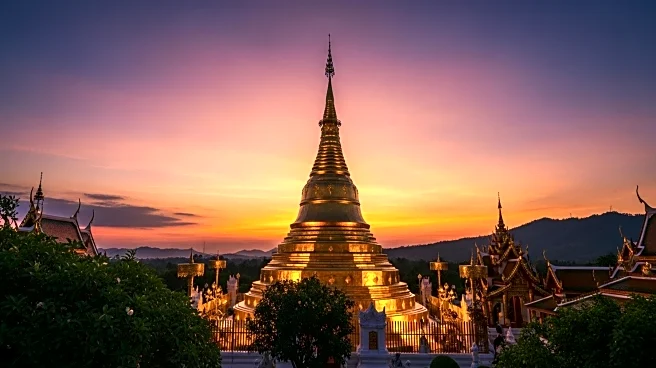The Shwedagon Pagoda, a sacred Buddhist stupa in Yangon, Myanmar, has a profound cultural influence that extends beyond its architectural grandeur. Known for housing relics of past Buddhas, including strands of hair from Gautama Buddha, the pagoda is a symbol of religious devotion and cultural identity. Its towering presence on Singuttara Hill, reaching 112 meters, makes it the most sacred Buddhist site in Myanmar, drawing pilgrims and tourists alike.
Intellectual and Cultural Influence
The intellectual and cultural influence of the Shwedagon Pagoda is evident in its role as a spiritual beacon and cultural landmark. The pagoda's significance in housing sacred relics connects the present with the spiritual past, fostering a sense of unity and shared heritage. Its architectural features, including the golden stupa, inspire art, literature, and cultural expressions, shaping the cultural landscape of Myanmar.
Policy or Industry Effects
The influence of the Shwedagon Pagoda extends to policy and industry effects, particularly in the realm of cultural preservation and tourism. The pagoda's status as a major tourist attraction has led to efforts to preserve its architectural and spiritual integrity, impacting policies related to cultural heritage and tourism management. These effects ensure that the pagoda remains a vibrant center for religious activities and cultural expression.
Global vs. U.S. Reach
Globally, the Shwedagon Pagoda is recognized as a symbol of spiritual and cultural significance, attracting pilgrims and tourists from around the world. For U.S. audiences, the pagoda represents an opportunity to explore and understand the rich cultural and spiritual traditions of Myanmar. Its significance as a cultural and religious landmark provides a unique perspective on the global diversity of spiritual expressions.
Critiques and Debates
Critiques and debates surrounding the Shwedagon Pagoda often focus on its preservation and management strategies. Ensuring the pagoda's architectural and spiritual integrity is a complex task that requires careful consideration of its cultural significance. These debates highlight the importance of effective management practices in preserving cultural heritage and fostering appreciation for global spiritual traditions.
















